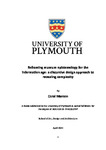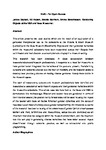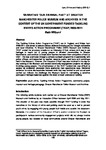Reframing museum epistemology for the information age: a discursive design approach to revealing complexity
| dc.contributor.supervisor | Phillips, Mike | |
| dc.contributor.author | Manton, Coral | |
| dc.contributor.other | School of Art, Design and Architecture | en_US |
| dc.date.accessioned | 2023-02-16T15:19:41Z | |
| dc.date.available | 2023-02-16T15:19:41Z | |
| dc.date.issued | 2023 | |
| dc.identifier | 10535868 | en_US |
| dc.identifier.uri | http://hdl.handle.net/10026.1/20411 | |
| dc.description.abstract |
This practice-based research inquiry examines the impact of an epistemic shift, brought about by the dawning of the information age and advances in networked communication technologies, on physical knowledge institutions - focusing on museums. The research charts adapting knowledge schemas used in museum knowledge organisation and discusses the potential for a new knowledge schema, the network, to establish a new epistemology for museums that reflects contemporary hyperlinked and networked knowledge. The research investigates the potential for networked and shared virtual reality spaces to reveal new ‘knowledge monuments’ reflecting the epistemic values of the network society and the space of flows. The central practice for this thesis focuses on two main elements. The first is applying networks and visual complexity to reveal multi-linearity and adapting perspectives in relational knowledge networks. This concept was explored through two discursive design projects, the Museum Collection Engine, which uses data visualisation, cloud data, and image recognition within an immersive projection dome to create a dynamic and searchable museum collection that returns new and interlinking constellations of museum objects and knowledge. The second discursive design project was Shared Pasts: Decoding Complexity, an AR app with a unique ‘anti-personalisation’ recommendation system designed to reveal complex narratives around historic objects and places. The second element is folksonomy and co-design in developing new community-focused archives using the community's language to build the dataset and socially tagged metadata. This was tested by developing two discursive prototypes, Women Reclaiming AI and Sanctuary Stories. | en_US |
| dc.language.iso | en | |
| dc.publisher | University of Plymouth | |
| dc.subject | museum | en_US |
| dc.subject | digital museums | en_US |
| dc.subject | museology | en_US |
| dc.subject | museums and data visualisation | en_US |
| dc.subject | museum epistemology | en_US |
| dc.subject | knowledge monuments | en_US |
| dc.subject | virtual museum | en_US |
| dc.subject | museums and networked society | en_US |
| dc.subject.classification | PhD | en_US |
| dc.title | Reframing museum epistemology for the information age: a discursive design approach to revealing complexity | en_US |
| dc.type | Thesis | |
| plymouth.version | non-publishable | en_US |
| dc.identifier.doi | http://dx.doi.org/10.24382/1164 | |
| dc.identifier.doi | http://dx.doi.org/10.24382/1164 | |
| dc.rights.embargoperiod | No embargo | en_US |
| dc.type.qualification | Doctorate | en_US |
| rioxxterms.funder | Arts and Humanities Research Council | en_US |
| rioxxterms.identifier.project | 3D3 Centre for Doctoral Research | en_US |
| rioxxterms.version | NA |
Files in this item
This item appears in the following Collection(s)
-
01 Research Theses Main Collection
Research Theses Main





